Latest arts reviews: UKARIA quintet, To Barbra with Love, From the Other Side of Chaos, Amadeus
Read the Tiser critics’ latest reviews including UKARIA quintet, To Barbra with Love, From the Other Side of Chaos, and Amadeus.
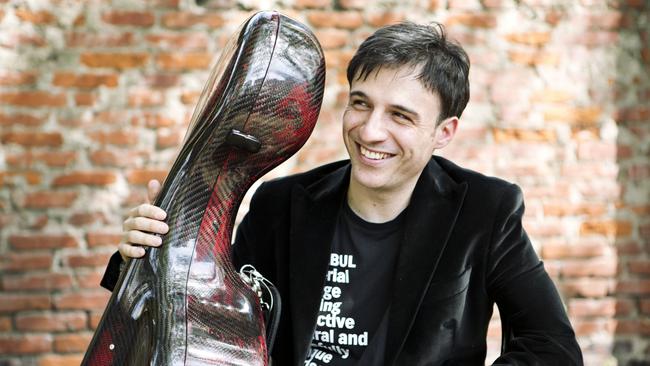
Arts
Don't miss out on the headlines from Arts. Followed categories will be added to My News.
Haveron, Winther, Breider, Clerici and Shamray
UKARIA Cultural Centre
December 3
Including the music of Viennese and Hollywood composer Erich Korngold is very de jour these days with many listeners wildly enthused. Having Korngold’s Piano Quintet in E share a program with one of Beethoven’s most hallowed works, the Quartet Op.130 complete with its original Grosse Fugue ending proved a bit of stretch though.
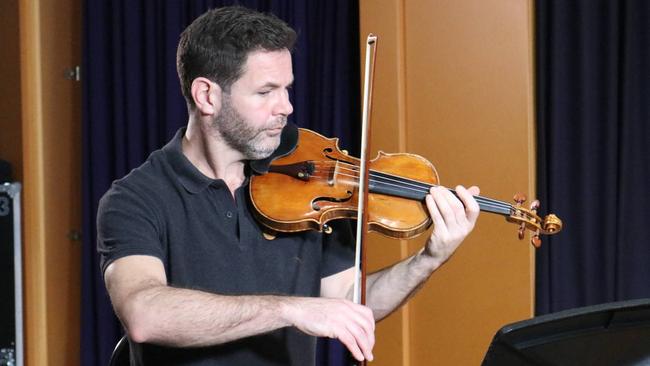
Nevertheless, violinists Andrew Haveron and Kristian Winther, violist Tobias Breider, cellist Umberto Clerici and pianist Konstantin Shamray are made of stern stuff and clearly relish a challenge. The fact the program worked to Korngold’s disadvantage might seem a fairly predictable outcome, but the concert certainly had shock value and listeners will remember it for some time.
Beethoven’s Quartet Op.130 is an immense and towering achievement, described sometimes as always sounding modern and never losing its relevance. Such angular, paired down, concentrated and kaleidoscopic writing demonstrated Beethoven’s genius in reinventing Bach’s polyphonic manner to suit a different age. Its six movements shimmer and startle with incandescent light, always hard work for listener and player, but ever positive, life affirming and never sentimental. Beethoven’s most eloquent and intense musical statements in its penultimate Cavatina movement were beautifully managed with strong, bold, decisive string playing that rightly never settled down.
By contrast Korngold’s 1921 Quintet, in his trademark late Viennese style, appeared over sentimental and downright gaudy at times. All five players gave hugely of themselves but even halfway through it was obvious the end didn’t justify the means, given Korngold’s purple hued score.
– Rodney Smith
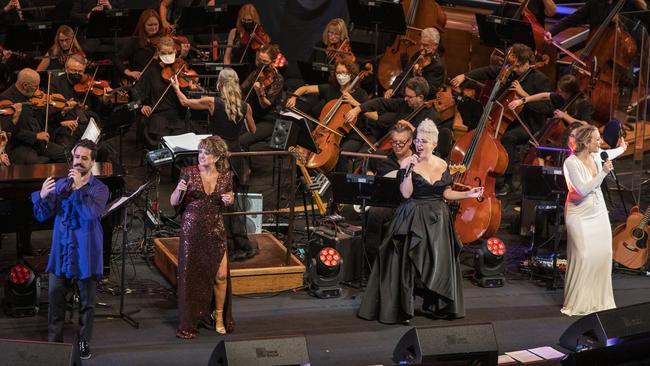
To Barbra With Love
Festival Theatre
December 2-3
Superstars don’t come much more super than Barbra Streisand, this year celebrating not only her 80th birthday but her 60th on stage.
An anniversary tribute mounted earlier this year in Melbourne now starts a whirlwind national tour.
With the combined voices of Caroline O’Connor, Katie Noonan, Elisa McCann and Ryan Gonzales, plus the Adelaide Symphony Orchestra under Vanessa Scammell … well, superlatives quickly become hard to find.
The music – sensational arrangements by Nicholas Buc – is superbly chosen to showcase the sheer breadth of Streisand’s achievements, and the roll-call of composers and lyricists with whom she’s worked.
Jerry Herman, Charles Strouse, the Bergmans and Neil Diamond, the brothers Gibb, Ager
and Yellen, Styne and Merrill, Burt Bacharach, Kender and Ebb, Bernstein, Sondheim.
And that’s not all.
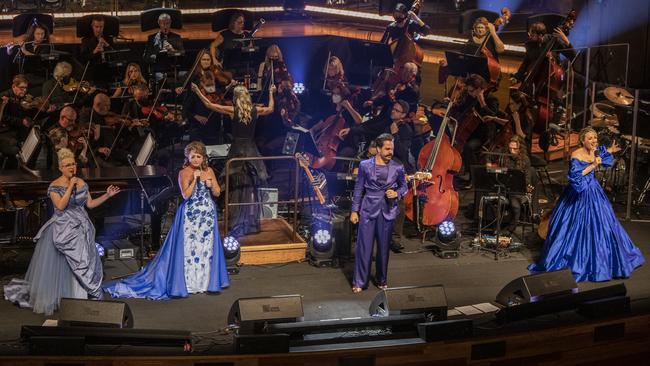
The singers are simply brilliant. O’Connor and Noonan already justly occupy lofty positions in the musical firmament. Elise McCann – most recently seen locally in Matilda – has a solid ten years and counting, while Ryan Gonzales is fast emerging as yet another of the triple threats on the Australian stage.
They all avoid the imitation game – why bother – and bring their own sensibility to tune after tune.
Of the 20-odd numbers, every one had something special. If a few stand out, they include
O’Connor’s Don’t Rain On My Parade and a deeply moving Send In The Clowns, Noonan’s Evergreen and Cry Me A River, McCann’s Before The Parade Passes By and Gonzales in You Don’t Bring Me Flowers (with McCann) and his own turn in How Lucky Can You Get.
Ensemble numbers book-ended the concert, Sondheim’s Putting It Together to begin, and Enough is Enough to end (very sensible, got everyone standing ready for the ovation) but the lingering memory is of a sincere tribute to a unique artist whose music continues to touch the hearts of all.
Two nights only. Be there.
– Peter Burdon
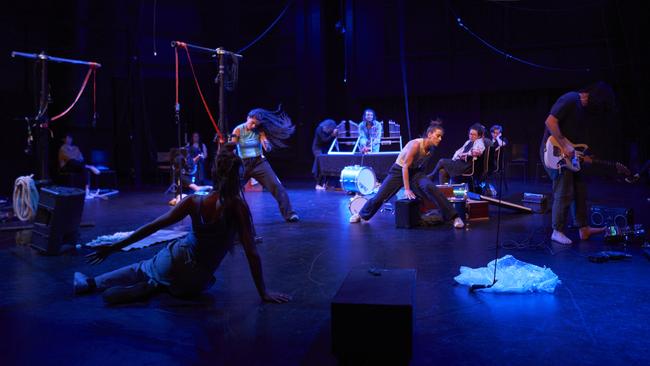
From The Other Side Of Chaos
Odeon Theatre
December 1-2
Australian Dance Theatre associate artist Tobiah Booth-Remmers is a prolific creator of really
innovative dance, drawing freely on both conventional and unconventional sources for inspiration.
From The Other Side Of Chaos is as much philosophical as exploratory, inviting us to look beyond the finite – perhaps, in the popular political jargon, the “rules-based order” – of the present to a time when simple interaction, or natural intuition (which, metaphysically, offers access to all knowledge) are our primary drivers.
So we have eight accomplished performers – dancers, musicians, and all-round creatives – doing what comes naturally, in their own way, and in their own time.
That is not to say From The Other Side Of Chaos doesn’t have a framework. It does, and it is tight as a drum.
There are many vignettes that linger in the mind. The occasional tender embrace, or a sudden
awareness that many people are moving in synch.
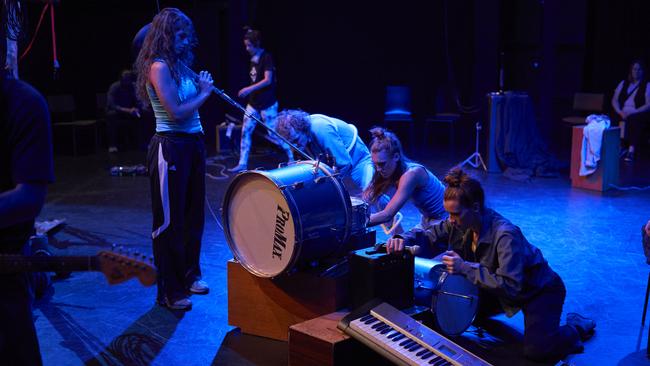
Vocally, there is a repeated monologue, “Welcome to the first day of the rest of your life”, from the Canadian/Ukrainian performer Olenka Toroshenko, who has great presence.
New music aficionado Gabriella Smart is captivating at the “electric cristals,” a microtonal
instrument created by gifted local composer Dylan Crismani after the remarkable Cristal Baschet.
Another memorable musical interlude was a sax solo from The Empty Threats lead Stu Patterson, faintly reminiscent of the Last Post or, just possibly, Close Encounters.
From The Other Side Of Chaos is not for the faint-hearted, often cacophonous, and at times fearfully loud – ear plugs are available – but is nonetheless an absorbing experiment.
It will be radically different on every occasion. It would be an excellent Festival piece.
– Peter Burdon
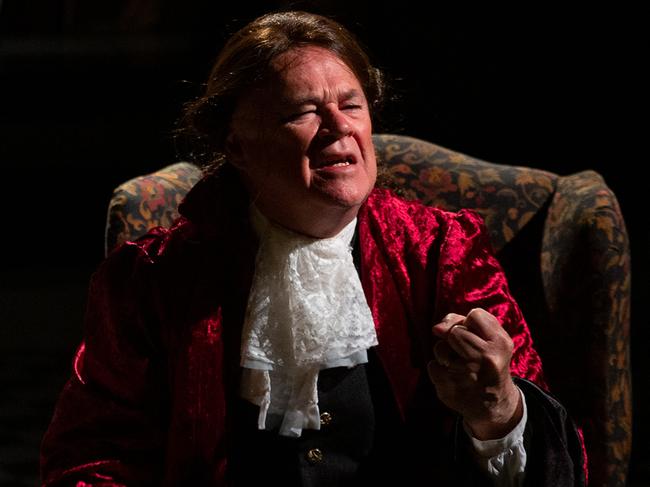
Amadeus, by Independent Theatre
Star Theatres
November 25 to December 3
Peter Shaffer’s Amadeus has become a mainstay for community theatres since it premiered in 1979. It’s a deft mix of high drama and wry amusement, and has proved a fine vehicle for many great actors.
The story is a highly fictionalised account of the relationship between Antonio Salieri, the august composer and conductor, whose influence in the Hapsburg court was of make-or-break importance for the ambitious Wolfgang Amadeus Mozart.
In Shaffer’s account, Salieri is a jealous hypocrite, Mozart an egotistical prodigy.
Independent Theatre’s David Roach is perfect in the lead. Salieri’s character is intensely complex. He was a fine composer, and his position unassailable – he stopped Mozart’s Don Giovanni in its tracks – yet his blind envy of the astonishing gifts of the Salzburg upstart leads him to conduct a cruel and unending vendetta.
Roach’s performance – and there is scarcely a moment when he’s not on stage – is epic. You can practically hear the mental cogs turning as he contrives and prosecutes yet another villainous plot.
The part of Mozart is among the most frequently overplayed roles in theatre, and this production is no exception.
Ben Francis, an excellent and versatile artist known to many for his leadership of fine vocal quartet The 60 Four, allowed far too much of the Frankie Valli star temperament into his performance.
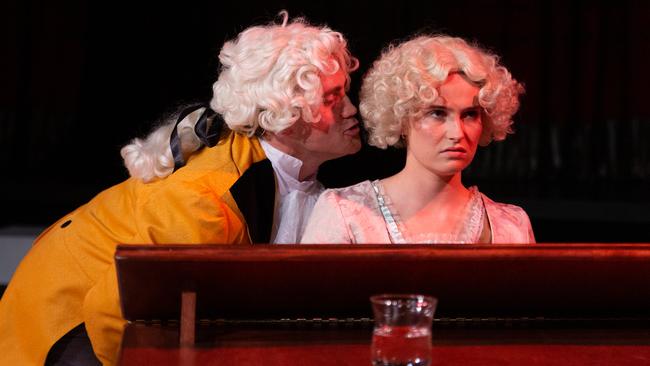
The flouncing and pouting, shouting and screaming, and above all the high-pitched squeals and giggles were unfailingly irritating. More seriously, they detracted from the steady reveal of the many facets of his character that is one of Shaffer’s many masterstrokes in this brilliant piece. Director please note.
Elsewhere among the cast, Kate Owen is in fine form as Mozart’s new wife Constanze, sharing his fickleness but with a certain practicality. Chris Bleby plays the Emperor Franz Joseph as a jauntily comic ruler, with an excellent running gag.
If Mozart is too big for his boots for much of the play’s duration, all is forgiven in the poignant denouement when the chemistry between the rivals is superb. And Salieri’s final monologue, when in old age he finally confronts his demons in a devastating confession of a man utterly bereft, is as fine a moment as you could wish for.
– Peter Burdon
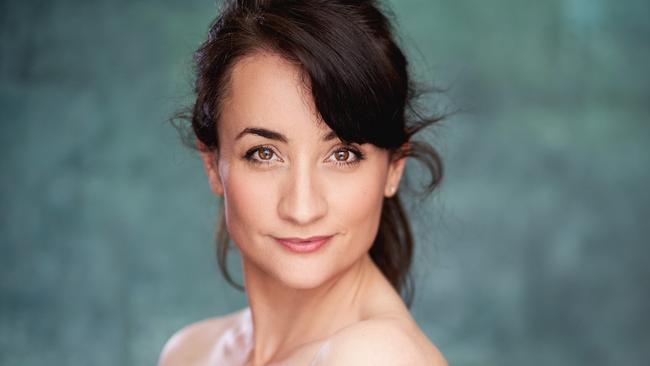
Adelaide Baroque
Solace and Joy: Music of the German Baroque
St Peter’s Cathedral
November 26
Next year will mark the 50th anniversary of the foundation, here in Adelaide, of Australia’s first dedicated early music ensemble. And for more than 40 years, Adelaide Baroque has been a national leader for its championing of authentic performance, and a knack for programming that’s second to none.
Their programs have explored the byways of early music, with many an unfamiliar name, but in their final concert for 2022, Solace and Joy: Music of the German Baroque, it was back to basics: JS Bach and a spot of Handel for good measure.
And what Bach is better-known than the so-called “Air on the G String” which was a quite perfect opener. For all its familiarity, what an exquisite piece it is, and how sensitively it was played.
A cantata followed, Komm du süße Todesstunde BWV 161, one of many dealing with the inevitable journey towards death. Alto (Nicolas Tolputt) and tenor (Richard Black) soloists both have fine arias, the former with some exciting writing and the latter with some delicious word-painting on “verlangen” (longing) with tense, taut suspensions.
The elegant A Minor concerto for violin and strings BWV 1041 showed guest leader Rachael Beesley in full flourish, even if the performance was somewhat subdued.
A trio of arias began the second half, with the other soloists Jessica Dean (soprano) and Alex Roose (bass) also making their presence felt.
Probably the most interesting piece was the Brandenburg Concerto No 6 BWV 1051. With violas da gamba and no violins, it stands apart, and any performance is an occasion. The orchestra was slow in settling, with some awkward intonation in the first movement, though this sorted itself out in due course.
The Handel was a rare performance of his setting of the Latin hymn Gloria in excelsis with Jessica Dean in scintillating form. It’s a youthful piece, and at times recklessly exuberant, but then again, immature Handel is still better than just about everyone else. The vocal writing is spectacular, with the opening movement and especially the Amen counting as virtuosic displays of coloratura fireworks. Brava!
There was a certain melancholy in the air, for the recent, incomprehensible decision not to renew the ensemble’s State funding means it may well be their last concert, at least in this expanded form. That would be an utter tragedy in the self-proclaimed State of the Arts.
– Peter Burdon
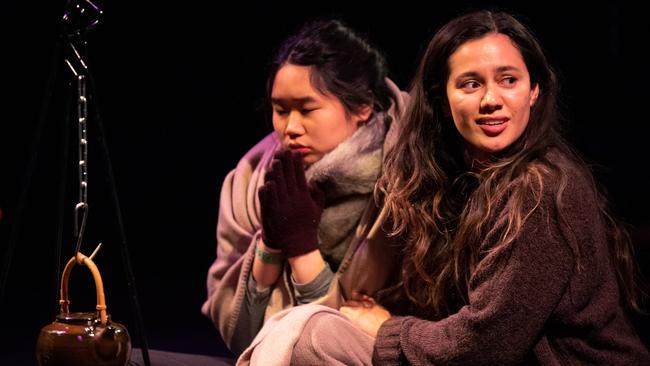
Coldhands
Rumpus Theatre
November 22 to December 4
For more than 20 years now, the winner of the Flinders University Young Playwright’s Award has been one to watch. So it is with Dora Abraham, who won the 2020 award with Coldhands, and now brings it to the stage for the first time.
Coldhands is a surreal mix of fact and fantasy. The consequences of environmental collapse are recast as a fantasy where the spectral Aurum Daemon holds sway over a fearful world, draining their bodies of the dull glimmers of hope – aurum means gold – they retain in a world where the natural order has broken down.
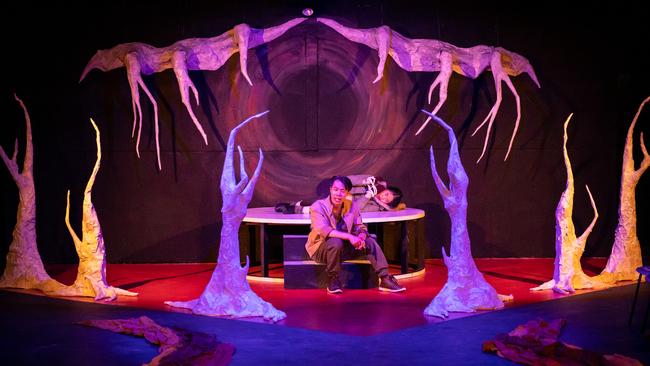
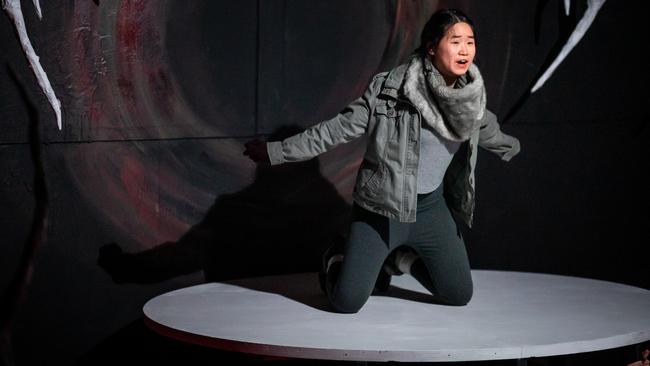
Directed by Zola Allen, the performing trio of Bonet Leate, Danielle Lim and Sam Lau fully embrace Abraham’s work. It’s often beautifully written, with much vivid imagery – the needs of the many outweighing the needs of the few, or the one, is especially resonant – and shows a passionate commitment to the art of storytelling.
The promised “immersive” experience doesn’t really come off, mainly owing to the near complete unfamiliarity of the audience with the fantasy world that’s been created.
There’s not so much as a word about the story in what passes for a program, which is a bit rough when you’re confecting a connection between global warming, the metaphysics of nature, and the human condition.
The serviceable design by Ellanna Murphy picks up on some of the more bizarre strands of the story, like rain falling up or trees growing down, and the lighting design by Kobe Donaldson is effective, given limited resources.
– Peter Burdon
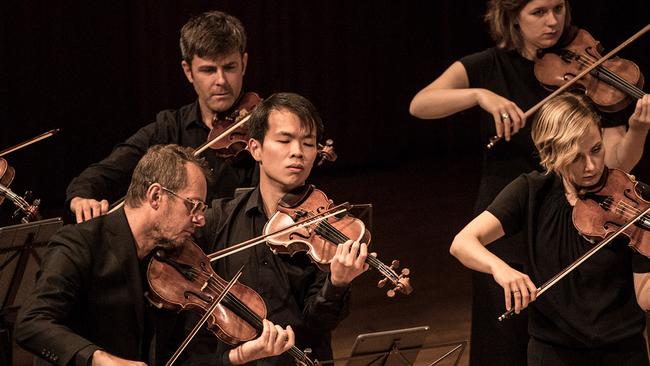
Australian Chamber Orchestra
Adelaide Town Hall
November 22
The United States exports many things – computers, cars, conspiracy theories – but its greatest export is culture, from films to TV series, to jazz, rock, hip-hop and much more besides.
Other countries may challenge it economically or militarily, but the USA has no rivals in the global reach of its culture in all its forms.
In this concert the Australian Chamber Orchestra presented a program called The American – a title I must take issue with, as Americans are inhabitants of the Americas, two continents stretching from the Arctic to Tierra del Fuego.
But it has been hijacked by the US to mean its own citizens.
It was a fascinating program, even if the music was uneven in quality. The rugged individualists of the past – Ives, Ruggles and Cage et al – were absent in favour of, for the most part, much younger composers.
We got a fair dose of post-minimalism. Bryce Dressner’s Aheym followed a well-worn pattern of this genre, but it did so with passion and intensity.
John Adams was represented by a selection of his Book of Alleged Dances, quirky and engaging pieces. Samuel Adams, son of John, had a premiere on this tour of his Echo Transcriptions, a rather unrelentingly dense, lyrical score featuring Richard Tognetti as soloist on electric violin.
Two works by Afro-American composers Florence Price and George Walker are not musically particularly strong but are historically significant. The outstanding work was a movement Morton Feldman’s Rothko Chapel, not really representative of this composer, but beautiful and haunting in its simplicity.
Antonin Dvorak was not an American and therefore an anomaly on this program, though he spent time there. But he was a great composer and his “American” Quartet is a gorgeous work with a particularly haunting slow movement.
This performance of Richard Tognetti’s transcription by the ACO was superb in every respect and a reminder, if we needed one, of what an extraordinary group of musicians they are.
– Stephen Whittington
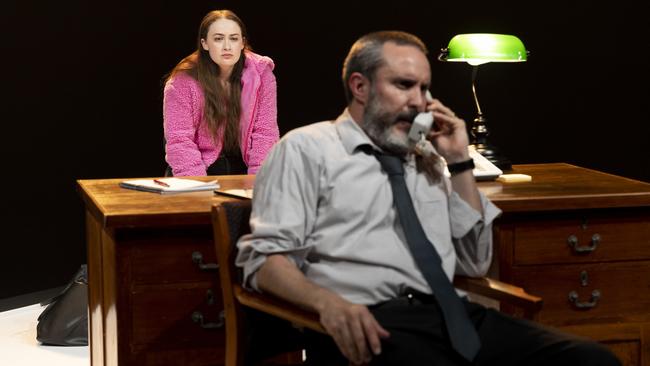
Oleanna
Flying Penguin Productions
Space Theatre
November 17-26
When David Mamet’s Oleanna premiered in 1992, it created a furore the likes of which had seldom been seen.
When it played off-Broadway, there were reports of audiences spilling onto the streets
continuing the furious argument of the play.
This searing two-hander pits learned academic John and student Carol against each other in a
stunning battle of wit and will.
Student Carol needs to pass John’s subject to have a chance at getting into graduate school, and visits him in a last-ditch attempt to gain the understanding of his course that eludes her.
His offer of a deal, some special tuition, leads to charges of sexual harassment, and quickly spirals out of control, with dire consequences all around.
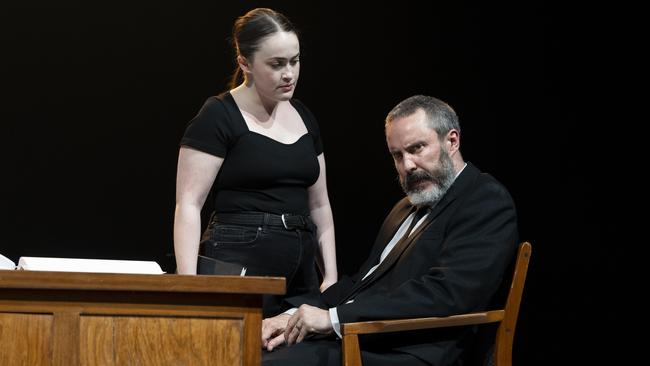
Director David Mealor is a dab hand at Mamet – his Glengarry Glen Ross last year was
sensational – and knows how to guide a turbulent emotional journey.
But a director is only ever as good as the cast, and in Renato Musolino and Georgia Laity, Mealor has struck gold.
Musolino is tremendous as John; his descent from pompous self-absorption to piteous ruin is truly a thing to behold.
As Carol, Laity emerges as a force to be reckoned with. Her transformation of the
character from timid weakling to confident aggressor is little short of amazing.
Yet both are responsive to the sudden, subtle shifts in the balance of power. It’s absolutely gripping.
Kathryn Sproul’s simple set, little more than a desk and a chair, and Chris Petridis’ subtle lighting allow the piece to speak for itself.
And so it needs to, for Oleanna still has a lot to say.
– Peter Burdon
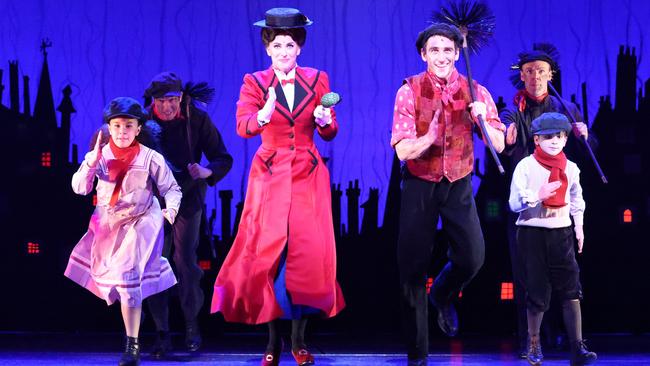
The magical nanny who is “practically perfect in every way” will finally fly into Adelaide when the stage musical version of Mary Poppins opens at the Festival Theatre in July.
Based on both the classic Disney film and the original books by Australian author PL Travers, the show’s first theatre tour in 2010-12 never made it to SA.
A new production, starring Stefanie Jones as Poppins and Jack Chambers as her chimney sweep friend Bert, opened in Sydney in May, is now in Brisbane, and will play Melbourne from late January before coming to Adelaide, then Perth.
The musical is co-presented by Disney and British theatre producer Sir Cameron Mackintosh, who met with Travers to secure the rights in 1993, three years before her death.
“I was entrusted by Pamela Travers herself with the rights to reimagine Mary Poppins as a stage musical,” Sir Cameron said.
“I am thrilled to be able to bring this ‘spit spot’ production to Adelaide for the very first time.”
As well as hit tunes like Supercalifragilisticexpialidocious, Chim Chim Cher-ee and A Spoonful of Sugar from the film, the stage version also features new songs and other scenes inspired by Travers’ books.
Tickets for performances from July 1-30 go on sale December 12 from Ticketek.
– Patrick McDonald
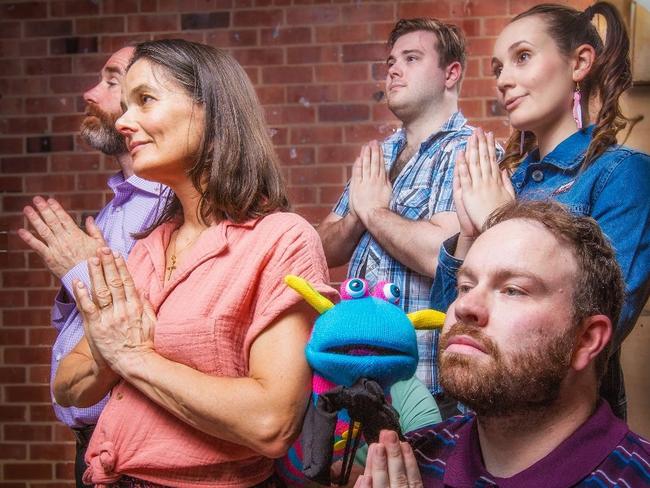
Hand to God
University of Adelaide Theatre Guild
Little Theatre
November 17-27
US playwright Robert Askins’ Hand to God is about as black as black comedies go. It’s given a lively performance by the University of Adelaide Theatre Guild in its South Australian premiere.
The setting is the God-fearing deep south where evangelical religion reigns supreme. Margery is a loyal member of pastor Greg’s congregation.
She can’t sing and she can’t cook, so her ministry is a sock puppet club, whose depictions of improving stories will hopefully evangelise young and old alike.
Enter the puppet Tyrone, not so much from stage left as from Hades-up. This evil creature takes possession of puppet troupe member Jason – who happens to be Margery’s son – and all Hell more or less literally breaks loose.
What follows is a wild, raucous romp, as the foul-mouthed, filthy-minded Tyrone leads the faithful few triumphantly into temptation.
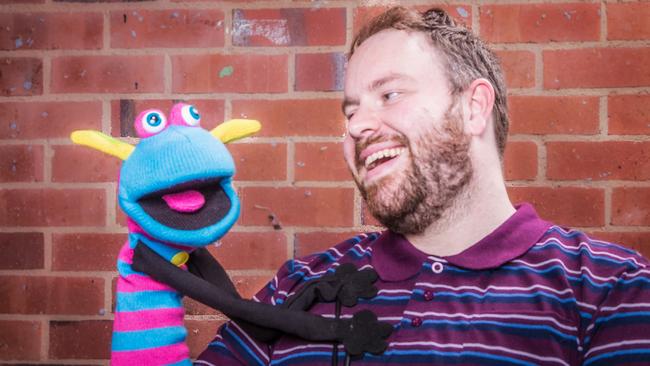
In the dual characters of Jason and Tyrone, Matt Houston is triumphant. He’s Adelaide’s go-to guy for larger-than-life roles.
As his harried mother, Emily Branford is absolutely on-point. For all the glibness of this tall tale, her character is complex, sad at the death of her husband, unsatisfied with her lot in life, and not a little frustrated.
Brendan Cooney is the pleasantly seedy pastor, a changing mix of saint and sinner.
There are some spectacularly funny moments, including the Abbott and Costello “Who’s on First?” routine and an Exorcist sequence bathed in hellish red.
When you’re dealing with priapic puppets, a firm hand is required, and director Nick Fagan mainly succeeds, though one or two of the more outlandish sequences lose control, particularly a “puppet sex” scene (yes, you read that correctly) which starts well but goes on far too long.
Some of the transgressive writing veers into smut, and actively demeans the women against whom it is directed without addressing, let alone resolving, the problem.
But it’s a fair expectation that the audience will have left their scruples at the door, and simply enjoy the ride.
– Peter Burdon
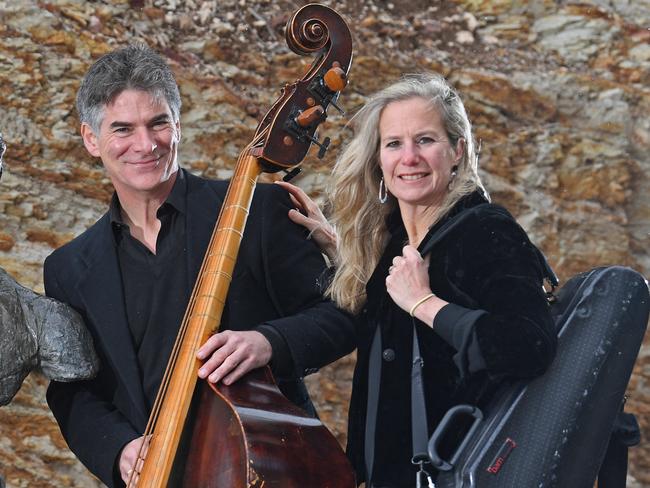
London 1824 – A Musical Soirée
North Adelaide Baptist Church,
November 13
I don’t know whether people have soirees anymore.
An elegant assembly of cultured people, copious amounts of champagne, a buffet table laden with truffled goose and exquisite pastries, accompanied by beautiful music – this seems to be out of step with the times we live in.
Maybe they do happen, I just don’t get invited. If you are planning a soiree though, you should definitely engage Heidi von Bernewitz, Thomas Marlin and Rob Nairn to provide the perfect musical entertainment.
These three excellent local musicians presented a truly delightful program based on what might have been played at such a soiree in London in 1824.
The music was rich in humour and wit, from Rossini and Haydn, whom you expect to be funny, and Beethoven, whom you possibly do not.
More serious, but no less enjoyable were fascinating works by Corelli and the practically forgotten Michael Kirsten.
It was all superbly played, with the musicians showing a keen appreciation of the inherent humour and shifting moods of the music. This was yet another splendid concert from Adelaide Baroque, which has enriched our cultural life over many decades.
– Stephen Whittington
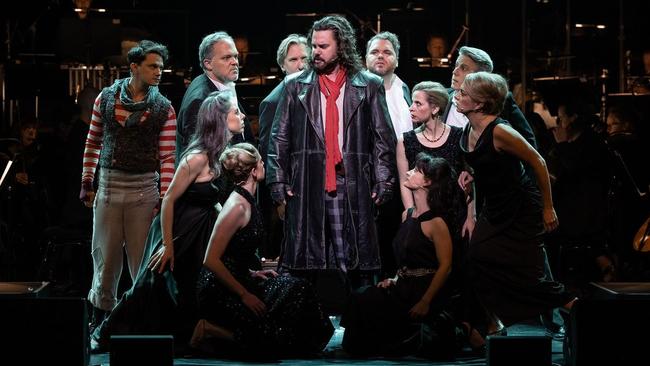
Bright Lights and Big Dreams
State Opera and Adelaide Symphony Orchestra
Her Majesty’s Theatre
November 11-12
Bright lights and big dreams, the promise of Broadway bliss, delivered marvellously by a starry cast, in a tribute to the late Stephen Sondheim and his mentors Leonard Bernstein and Richard Rogers.
This pageant of songs familiar and unfamiliar brought Adelaide favourites on stage with the Adelaide Symphony Orchestra, directed deftly by Anthony Hunt.
The showpiece Overture to Candide showed what this orchestra can do, and the sound poured from the stage with exemplary clarity. Sound engineers take a bow.
The charismatic Ben Mingay’s recent Adelaide successes were revisited. His Carousel duet with Desiree Frahn was enchanting but his partnership with Antoinette Halloran in the big
number from Sweeny Todd was mouthwateringly delicious.
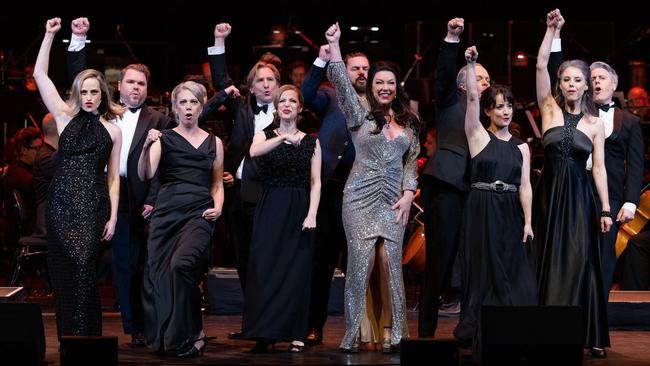
Matt Verevis brought great tenderness to his Nothing’s Going to Harm You’.
The rest of the cast showed just how much talent Adelaide can muster, and Stuart Maunder’s direction took full advantage of their energy and experience.
Mark Oates, James Nicholson, Jeremy Tatchell and Nicholas Cannon were unlikely Sharks and Jets in Westside Story but classy sailor boys in South Pacific.
Four remarkable women were more than a match. Jessica Dean and Jessica Mills, Rachel McCall and Rosie Hosking separately and together were fantastic. Bring them all together for A Weekend in the Country and they make magic.
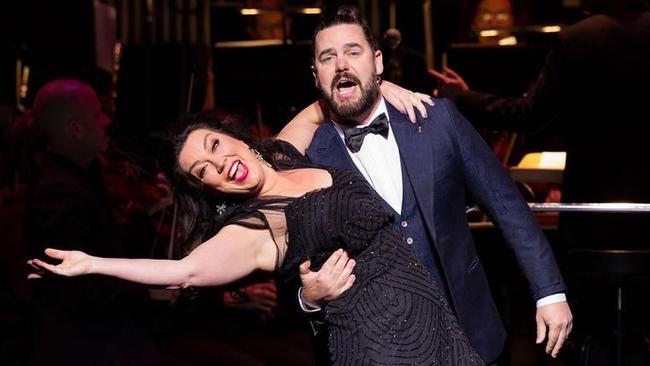
It’s easy after a show like this to tick off the cast names, remember to mention Ben Flett’s lighting, drag out the thesaurus of useful adjectives and relive what was a night to remember.
This production – mounted, I’m assured, at very high speed – showed the emotional range and power of the 20th century Broadway musical, served with and by the finest of talent.
I won’t pick favourite moments. Every member of the transported audience left humming a different tune. I was channelling the orphan hero of another show: “Please Mr Maunder, can I have some more?”
We live in interesting times, but as the finale to Carousel brought the evening to a close we need to remember that we never walk alone.
– Ewart Shaw
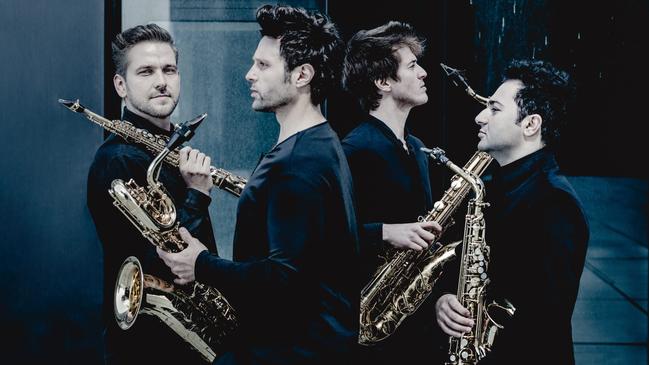
Signum Saxophone Quartet with Kristian Winther
Adelaide Town Hall
November 10
“Two Italians and two Serbians walk into a German bar” might sound like the start of a tall tale, but it’s no exaggeration to say that the Australian debut tour of the Signum Saxophone Quartet is a triumphant success.
From Bach to Bernstein, this superb ensemble – Blaž Kemperle (soprano), Jacopo Taddei (alto), Alan Lužar (tenor) and Guerino Bellarosa (baritone) – put on a bravura display of musicianship.
Beginning with Bach’s popular Italian Concerto, the quartet at once demonstrated absolute security with the music and, vitally, each other.
The centrepiece of the concert was an arrangement of Kurt Weill’s Concerto for Violin and Wind Orchestra. Already known for his stage works, the concerto was arguably the work in which Weill staked his claim to greatness across the musical spectrum.
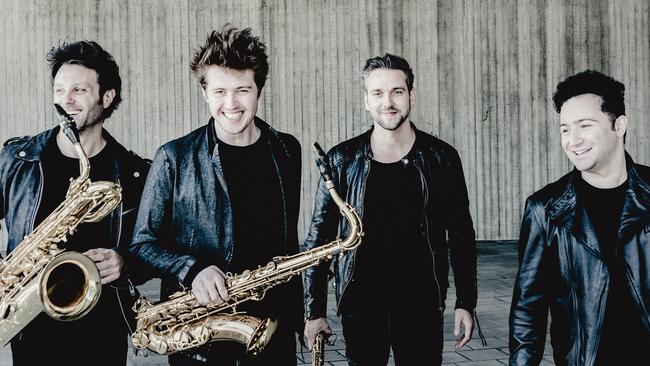
It’s fiendishly difficult, especially for the soloist, more so for being so rarely performed.
In the premiere performances of a Musica Viva commissioned arrangement by Jessica Wells, violinist Kristian Winther showed himself very much up to the challenge. It was a spectacular account, full of contrasts, with hints of just about everyone from Bach to Weill’s teacher, Busoni, through Mahler and Stravinsky. Extraordinary.
Gershwin’s Three Preludes from 1926 took us straight into the jazz age, where the saxophone found its forever home, and these were wonderful performances, silky and smooth. Bernstein’s glorious Symphonic Dances from West Side Story had the jazz influences too, along with popular song and irresistible Latin rhythms.
Chick Corea’s jazz-fusion masterpiece Spain, and a toe-tapping, energetic tango from Piazzolla by way of encore, rounded out a brilliant program, a real night to remember.
– Peter Burdon
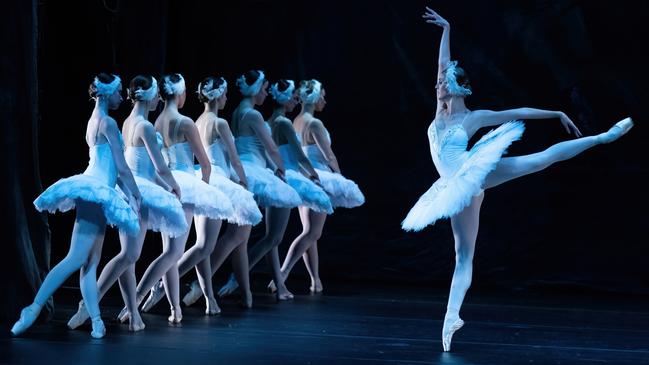
United Ukrainian Ballet
Swan Lake
Festival Theatre
November 9-13
“Make dance, not war” said the slogan on the Ukrainian flag as the members of the United Ukrainian Ballet sang their national anthem, supported in full voice by a goodly number of Adelaide’s expat Ukrainian community.
It certainly made for an unforgettable curtain call at the performance of Swan Lake that this new company, formed out of the horrors of war, is touring in Australia.
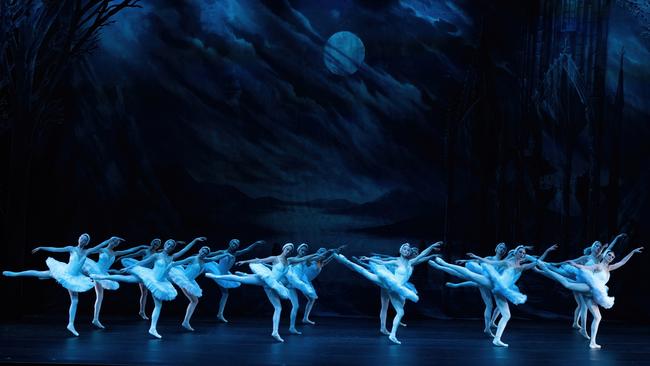
For those who might have missed it, the company formed earlier this year as dancers from Ukraine fled their homeland. Many gravitated to the Netherlands, where the local dance community has supported their establishment. Just a few months later, they are taking their dance to the world.
And what better calling card than that hardiest of ballet perennials, Swan Lake. (It’s also a safe choice, given it’s in repertoire just about everywhere.)
Everyone knows the story. Prince Siegfried falls in love with a beautiful woman, Odette. She is, alas, a swan by day owing to a malicious spell of the evil sorcerer Rothbart, who seeks to marry his own daughter, Odile, to the besotted prince. The spell can only be broken by a pledge of undying love.
And indeed, Swan Lake stands and falls on the principals, especially the dancer in the dual roles of Odette/Odile.
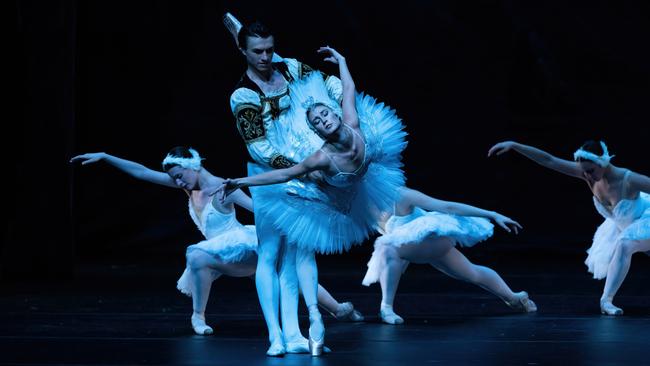
Here the company strikes gold. Kateryna Chebykina is magnificent, technically assured and emotionally invested, anguished as the forlorn Odette, siren-like as the seductive Odile.
Her Siegfried, Oleksii Kniazkov, is likewise top shelf.
It’s almost all about them, and their many encounters all work beautifully. The White Swan pas de deux is poised in the extreme, especially the adagio – at the slowest possible speed – while in Act II, the celebrated Black Swan pas de deux positive sizzles.
Kniazkov’s lifts, in particular, are sensational.
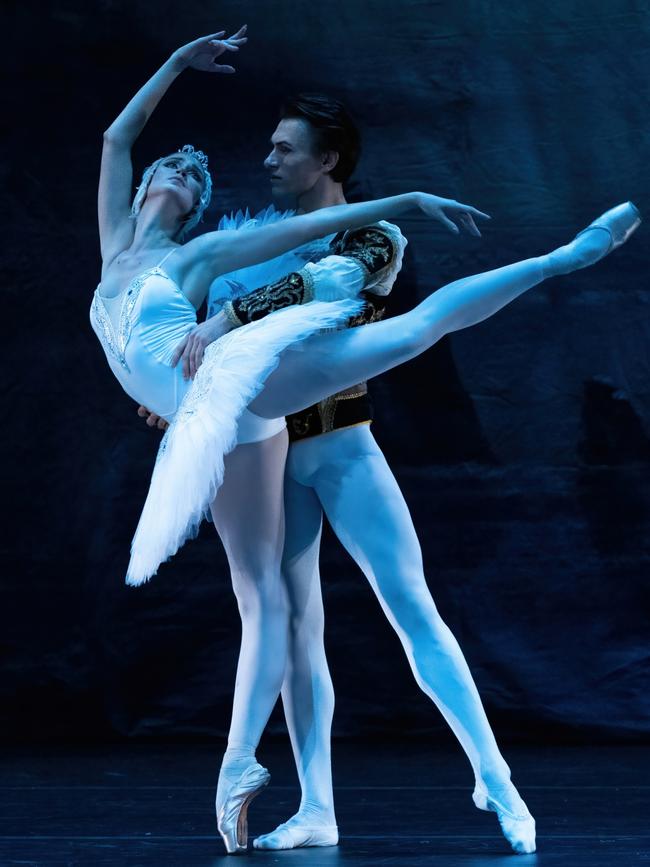
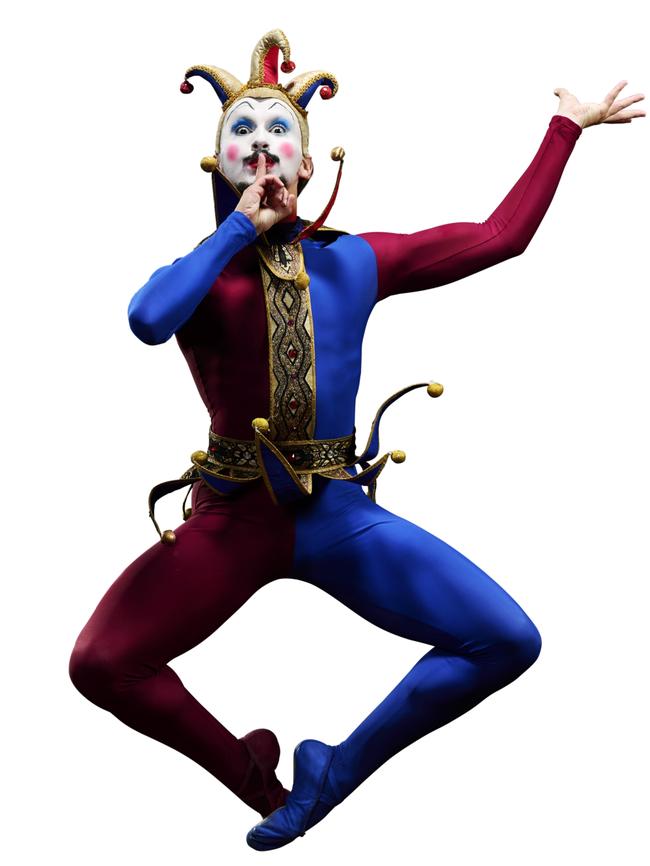
In other named roles, Pavlo Zurnadzhi as the leaping Jester stole many a scene, while Oleksiy Grishun was a glaring, glowering Rothbart, looking very avian in black and feathers.
Major set pieces all come off well. The famous scene by the lake where Odette and her swans, all dressed in white tutus, dance together, moving and breathing as one with their rippling ports de bras, the dance of the Cygnets, and the jolly national dances, all add to the sense of occasion.
The production claims to be a “reimagining” but seldom strays far from tradition, whether choreographically or visually.
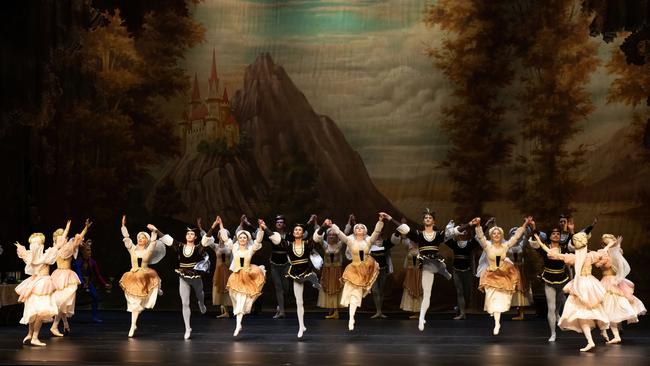
Scenically, it’s a “mend-and-make-do” affair with hoary old hanging curtains and faux Tudor costumes. That said, the quality is good, and the only real misstep comes in the parade of eligible maidens before the prince, whose white “Look-at-me-I’m-a-virgin” dresses were thoroughly de trop.
This isn’t a “star-crossed lovers” Swan Lake where it all ends sadly. The image of the defeated Rothbart at the feet of the triumphant couple is very apt.
It is a plea for justice, and a demand for peace. For that reason alone it deserves the community’s support.
– Peter Burdon

Alexander Gadjiev, piano
Elder Hall
November 7
Competitions are a big thing in the world of classical music.
However much one might decry the insidious emphasis on competitiveness in the rarefied realm of high art, the fact is that it for a young musician to stand out from the multitude of other musicians trying make a career, a competition win is a big advantage.
So Alexander Gadjiev comes to us as the winner of the 2021 Sydney Piano Competition, with a 2nd Prize in the Chopin Competition to boot.
Gadjiev’s program was unusual. Avoiding the clichéd parade of virtuosic warhorses that competition winners often trundle out, he began with Earth Preserving Chant by American composer Kyle Gann, whose music is little known in Australia.
Over a subtly shifting drone, fragmentary phrases appear, disappear and return with hypnotic effect. It is understated but powerful, and an unusual way to start a recital.
Another unusual inclusion was Eine Kleine Nachtmusik by Australian Colin Spiers, a complex and demanding piece with a surreal edge to it.
Gadjiev’s imaginative programming is matched by his imaginative playing. Chopin appeared prominently in this recital, but the performances were distinguished by their originality.
Particularly notable was his visionary reading of the Polonaise-fantaisie, played with improvisatory freedom.
Chopin’s Sonata No. 2 showed more of Gadjiev’s virtuosic flair, imagination and sense of drama. But at times his enthusiasm led him to player faster than necessary, producing excitement at the expense of a loss of clarity.
– Stephen Whittington
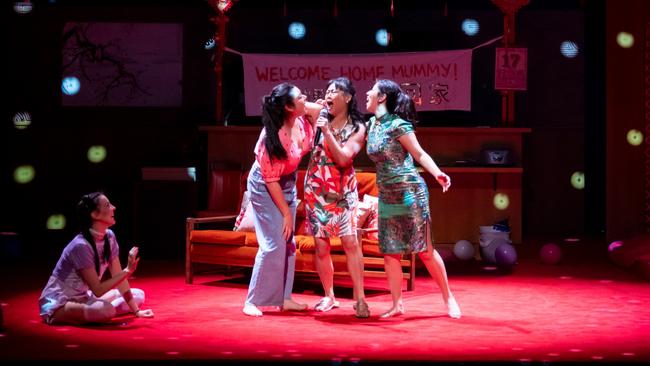
Single Asian Female
Dunstan Playhouse
Until November 19
Michelle Law (of Homecoming Queens fame, among many achievements) broke new ground in Australian theatrical writing with her debut play, Single Asian Female, it being the first Australian play to feature three Asian-Australian women in leading roles.
We were to have this treat in 2020, but alas, it was among the first casualties of the pandemic. But here it is, better late than never, and especially appropriate for being presented in partnership with the OzAsia Festival.
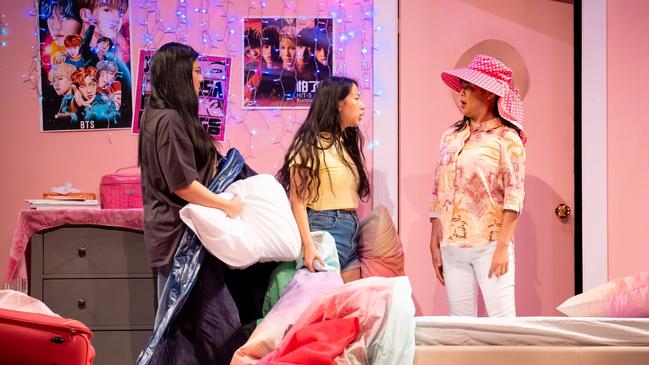
In truth we have not one but three single Asian females in the play.
Pearl (Fiona Choi) came to Australia from Hong Kong many years ago, and has devoted her entire life to bringing up her two daughters Zoe (Juanita Navas-Nguyen) and Mei (Elvy-Lee Quici) in the absence of their father, a nasty piece of work who shot through, but casts a long shadow.
Pearl is a delicious character, the archetypal tiger mother who loves her children to bits, but drives them relentlessly in an effort to ensure their success.
Her enthusiasm frequently overwhelms her, and with that her command of English slips, with hilarious malapropisms aplenty.
Her efforts have been rewarded. Zoe is a gifted musician, aspiring to an orchestral chair, while Mei is finishing school as an A-grade student.
When the ex-husband’s business dealings are revealed to have been a sham, the family confronts a life-changing crisis. The build up to the delivery of this body blow, in a cry from the depths of Pearl’s heart, is superbly handled, and is an excellent contrast to the snappy, sketch-like comic sequences that pepper the piece.
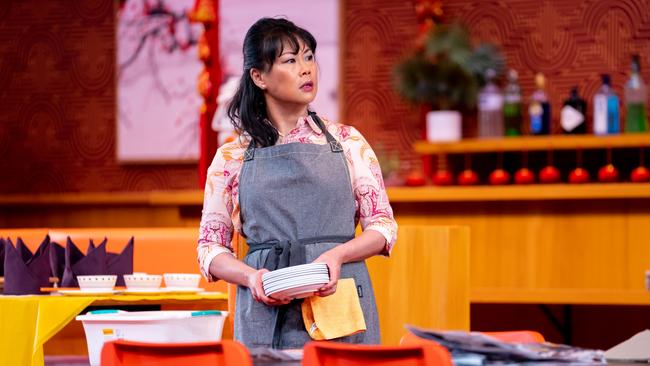
Director Nescha Jelk keeps the action moving, very importantly in such a wordy piece.
These are familiar tropes, but Law traverses well-trodden paths with consummate skill. She covers an immense range of topics, many of them deeply sensitive: Racism, of course – and we’re not spared the vile racial slurs – and the hidden nature of domestic violence in many Asian cultures.
There’s also the fluid self-image experienced by many second generation Asian-Australians, melding the expectations of immigrant heritage and Australian identity.
Single Asian Female is overlong, a fact that hasn’t gone unnoticed these past five years. There are a few didactic moments that border on the patronising, and there are so many issues, some raised merely in passing, that a cut or two (even a lucky eight) wouldn’t hurt. Nor would it diminish the impact of a fine piece of new Australian theatre.
– Peter Burdon
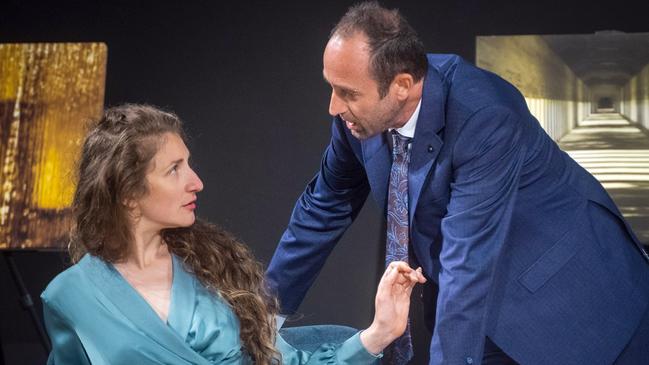
Reasonable Doubt
Holden Street Theatres
November 2-12
The week after a jury was sensationally dismissed in the Brittany Higgins case, STARC Productions presents Reasonable Doubt, in which the machinations and manipulations of a jury are laid bare.
The company’s previous production of Suzie Miller’s 2008 two-hander was a cracker – no surprise with director Tony Knight, who’s known playwright Miller from their NIDA days, at the helm.
Miller has since revised the play and, in its new incarnation, it’s a darker piece which positively sizzles.
It’s a dense piece of writing, requiring actors who can turn on a pinhead as the focus and tension shift, often with startling intensity.
Such a two are Stefanie Rossi and Marc Clement.
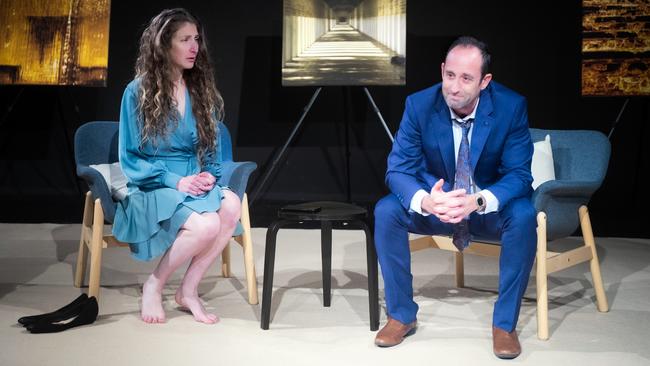
Both play jurors in a murder trial where the majority, favouring a guilty verdict, were effectively persuaded by just two of their number to acquit.
These two broke at least one rule, by hooking up one night. As we soon find out, more rules were broken still.
Two years later, the verdict has been overturned on appeal, and the matter is to be retried. The
jurors in the original matter decide, curiously and perhaps unwisely, to meet once more. Late at night, the two lovebirds are at it again.
Both characters have their flaws, and both have their demons. Rossi and Clement run the gamut of emotions in a packed 60 minutes – the timing is brilliant – and we quickly find out that things are seldom what they seem. There are plenty of gasps of astonishment.
As the Higgins matter remains in the news, Reasonable Doubt is a topical piece indeed.
– Peter Burdon


